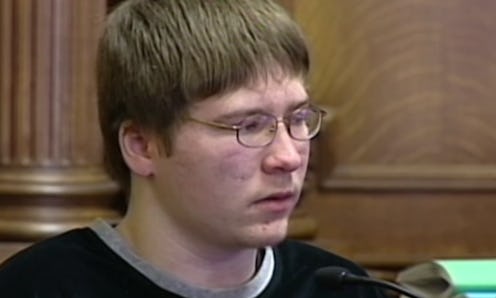News
The Supreme Court Just Dealt A Huge Blow To This 'Making A Murderer' Case

The Supreme Court decided not to hear one of the most famous cases that could have been on their docket this year. The Netflix documentary series Making A Murderer made the men convicted of killing photographer Teresa Halbach a household name. And on Monday, the Supreme Court denied Brendan Dassey’s writ of certiorari — a huge blow to his case.
Essentially SCOTUS refused to reconsider the findings of the appeals court. That means they won't be hearing his case. Four justices are required to agree to hear a case; how many — if any — supported hearing the case is not released.
This could leave Dassey in jail until 2048. That's when the now 28-year-old will be eligible for "extended supervision" or parole and could complete his sentence outside of prison. Dassey's lawyers had argued that his confession, which was given when he was just 16, was false and that he had been coerced by police when questioned.
"Such failures may be explained at least partly by the fact that nearly forty years have passed since the Court’s last juvenile-voluntariness case," they wrote in their appeal to the Supreme Court. "Whatever the reason, reaffirmance of the Court’s holdings, and demonstration of how they are to be properly implemented, is urgently needed."
Similar arguments were successful when heard by the lower courts, but the Seventh Circuit Court of Appeals in Chicago upheld his conviction in December. That ruling is what Dassey's lawyers hoped to revisit with the Supreme Court, but with the denial to hear the case, it will stand. That court voted 4 to 3 on the matter to uphold the conviction.
The appeals court wrote that Dassey's confession was given “freely, after receiving and understanding Miranda warnings, and with his mother’s consent.” Furthermore, the court wrote it was “in a comfortable setting, without any physical coercion or intimidation, without even raised voices, and over a relatively brief time.” The court continued:
Dassey provided many of the most damning details himself in response to open‐ended questions. On a number of occasions he resisted the interrogators’ strong suggestions on particular details. Also, the investigators made no specific promises of leniency.
In addressing SCOTUS, the Wisconsin Department of Justice further argued that it was inappropriate for the federal court to make a judgment on the matter given that it would be ruling over what the state court had found using "reasonable application of a fact-bound, totality-of-the-circumstances test." That's what the Supreme Court has instructed in similar cases.
But some experts sided with Dassey. "Juveniles and those with intellectual deficits are at particular risk of confessing involuntarily — and often falsely — under the strain of coercive police tactics," said Seth Waxman, a former U.S. solicitor general, told NBC News.
Those arguments will ultimately not be heard by the Supreme Court, which will not rule on the matter. Some 7,000 to 8,000 petitions reach SCOTUS every year with plaintiffs or defendants hoping the highest court in the land will give the final word on their fates. Only about 80 a year are heard, and Dassey's was not one of them.
This might not offer Dassey more options, but it doesn't mean that Making a Murderer subjects will stay out of courts. Dassey's uncle, Steven Avery, is also appealing his conviction. The Wisconsin Court of Appeals in June sent Avery's case to the state circuit court to consider whether a compact disc that Avery's defense says contains exculpatory, material evidence can be considered for admission.
Avery's lawyer says the state hadn't previously disclosed the existence of the CD and that means he wasn't given due process to a fair trial. Dassey might have more options through the court system, but the Avery's case could continue for quite some time.